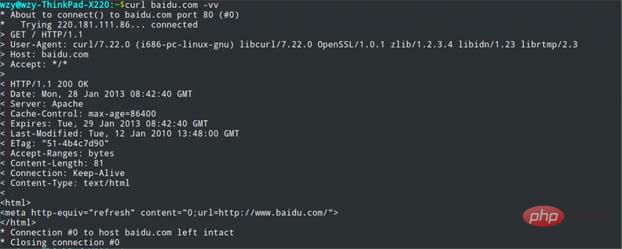What are the methods to force nginx to use https access?
nginx的rewrite方法
思路
这应该是大家最容易想到的方法,将所有的http请求通过rewrite重写到https上即可
配置
server {
listen 111:80;
server_name testcom;
rewrite ^(*)$ https://$host$1 permanent;
}搭建此虚拟主机完成后,就可以将http://test.com的请求全部重写到https://test.com上了
nginx的497状态码
error code 497
497 - normal request was sent to https
解释:当此虚拟站点只允许https访问时,当用http访问时nginx会报出497错误码
思路
利用error_page命令将497状态码的链接重定向到https://test.com这个域名上
配置
server {
listen 11:443; #ssl端口
listen 11:80; #用户习惯用http访问,加上80,后面通过497状态码让它自动跳到443端口
server_name testcom;
#为一个server{}开启ssl支持
ssl on;
#指定pem格式的证书文件
ssl_certificate /etc/nginx/testpem;
#指定pem格式的私钥文件
ssl_certificate_key /etc/nginx/testkey;
#让http请求重定向到https请求
error_page 497 https://$host$uri?$args;
}index.html刷新网页
思路
上述两种方法均会耗费服务器的资源,我们用curl访问baidu.com试一下,看百度的公司是如何实现baidu.com向www.baidu.com的跳转

可以看到百度很巧妙的利用meta的刷新作用,将baidu.com跳转到www.baidu.com.因此我们可以基于http://test.com的虚拟主机路径下也写一个index.html,内容就是http向https的跳转
index.html
<html> <meta http-equiv="refresh" content="0;url=https://testcom/"> </html>
nginx虚拟主机配置
server {
listen 11:80;
server_name testcom;
location / {
#indexhtml放在虚拟主机监听的根目录下
root /srv/www/httptestcom/;
}
#将404的页面重定向到https的首页
error_page 404 https://testcom/;
}The above is the detailed content of What are the methods to force nginx to use https access?. For more information, please follow other related articles on the PHP Chinese website!

Hot AI Tools

Undresser.AI Undress
AI-powered app for creating realistic nude photos

AI Clothes Remover
Online AI tool for removing clothes from photos.

Undress AI Tool
Undress images for free

Clothoff.io
AI clothes remover

Video Face Swap
Swap faces in any video effortlessly with our completely free AI face swap tool!

Hot Article

Hot Tools

Notepad++7.3.1
Easy-to-use and free code editor

SublimeText3 Chinese version
Chinese version, very easy to use

Zend Studio 13.0.1
Powerful PHP integrated development environment

Dreamweaver CS6
Visual web development tools

SublimeText3 Mac version
God-level code editing software (SublimeText3)

Hot Topics
 1389
1389
 52
52
 How to configure cloud server domain name in nginx
Apr 14, 2025 pm 12:18 PM
How to configure cloud server domain name in nginx
Apr 14, 2025 pm 12:18 PM
How to configure an Nginx domain name on a cloud server: Create an A record pointing to the public IP address of the cloud server. Add virtual host blocks in the Nginx configuration file, specifying the listening port, domain name, and website root directory. Restart Nginx to apply the changes. Access the domain name test configuration. Other notes: Install the SSL certificate to enable HTTPS, ensure that the firewall allows port 80 traffic, and wait for DNS resolution to take effect.
 How to check nginx version
Apr 14, 2025 am 11:57 AM
How to check nginx version
Apr 14, 2025 am 11:57 AM
The methods that can query the Nginx version are: use the nginx -v command; view the version directive in the nginx.conf file; open the Nginx error page and view the page title.
 How to start nginx server
Apr 14, 2025 pm 12:27 PM
How to start nginx server
Apr 14, 2025 pm 12:27 PM
Starting an Nginx server requires different steps according to different operating systems: Linux/Unix system: Install the Nginx package (for example, using apt-get or yum). Use systemctl to start an Nginx service (for example, sudo systemctl start nginx). Windows system: Download and install Windows binary files. Start Nginx using the nginx.exe executable (for example, nginx.exe -c conf\nginx.conf). No matter which operating system you use, you can access the server IP
 How to check the name of the docker container
Apr 15, 2025 pm 12:21 PM
How to check the name of the docker container
Apr 15, 2025 pm 12:21 PM
You can query the Docker container name by following the steps: List all containers (docker ps). Filter the container list (using the grep command). Gets the container name (located in the "NAMES" column).
 How to check whether nginx is started
Apr 14, 2025 pm 01:03 PM
How to check whether nginx is started
Apr 14, 2025 pm 01:03 PM
How to confirm whether Nginx is started: 1. Use the command line: systemctl status nginx (Linux/Unix), netstat -ano | findstr 80 (Windows); 2. Check whether port 80 is open; 3. Check the Nginx startup message in the system log; 4. Use third-party tools, such as Nagios, Zabbix, and Icinga.
 How to configure nginx in Windows
Apr 14, 2025 pm 12:57 PM
How to configure nginx in Windows
Apr 14, 2025 pm 12:57 PM
How to configure Nginx in Windows? Install Nginx and create a virtual host configuration. Modify the main configuration file and include the virtual host configuration. Start or reload Nginx. Test the configuration and view the website. Selectively enable SSL and configure SSL certificates. Selectively set the firewall to allow port 80 and 443 traffic.
 How to deploy jar program in nginx
Apr 14, 2025 pm 12:09 PM
How to deploy jar program in nginx
Apr 14, 2025 pm 12:09 PM
To deploy a JAR program on Nginx, seven steps need to be followed: 1) Install JRE, 2) Install Nginx, 3) Configure Nginx, 4) Deploy JAR, 5) Grant execution permissions, 6) Restart Nginx, 7) Verify deployment.
 How to run nginx apache
Apr 14, 2025 pm 12:33 PM
How to run nginx apache
Apr 14, 2025 pm 12:33 PM
To get Nginx to run Apache, you need to: 1. Install Nginx and Apache; 2. Configure the Nginx agent; 3. Start Nginx and Apache; 4. Test the configuration to ensure that you can see Apache content after accessing the domain name. In addition, you need to pay attention to other matters such as port number matching, virtual host configuration, and SSL/TLS settings.




